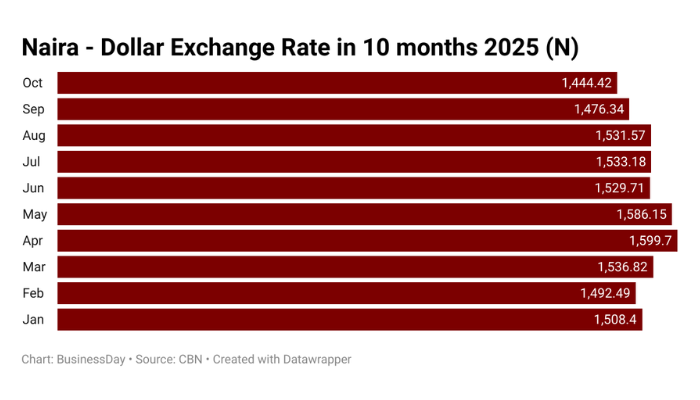Naira hits 10-month high as investors cut dollar holdings
…External reserves surpass $43bn mark
…FDI inflows surge by $272.6m
The naira hit a 10-month high of N1,444.42 per dollar in the official foreign exchange market on Wednesday, as dollar holders continued selling down their positions and increasing exposure to naira-denominated assets.
The sustained appreciation of the local currency has been supported by improved market liquidity and renewed optimism in the economy, leading to rising capital inflows and stronger external reserves.
The latest performance represents a gain of N216.70 or about 15 percent compared to the N1,661.12 per dollar recorded in December 2024, when trading commenced on the Electronic Foreign Exchange Matching System (EFEMS).
Read also: Naira rises to all-time high since EFEMS debut
On day-to-day basis, the naira strengthened by 0.3 percent, appreciating from N1,448.20 per dollar on Tuesday to N1,444.42 on Wednesday, according to data from the Central Bank of Nigeria (CBN).
At the parallel market, also known as the black market, the naira appreciated further, closing at N1,480 per dollar on Wednesday, up by N5, from the N1,485 per dollar recorded the previous day. Meanwhile, Nigeria’s external reserves have maintained a steady rise, surpassing the $43 billion mark to reach $43.10 billion as of October 28, 2025, according to the CBN data.
Analysts attribute the latest gains to a combination of factors, including renewed investor sentiment, improved market liquidity, and declining speculative demand.
Ayodeji Ebo, managing director/Chief Business Officer at Optimus by Afrinvest, said the sustained stability in the FX market has strengthened investor confidence, “prompting many to reduce their dollar holdings and increase exposure to naira-denominated assets.”
He explained that the narrowing gap between official and parallel market rates has encouraged more inflows through formal channels, particularly from diaspora remittances.
While Nigeria’s removal from the Financial Action Task Force (FATF) grey list is a positive development, Ebo noted that it might be too early to attribute the naira’s strength directly to that factor. “Overall, improved liquidity, reduced speculation, and rising confidence in policy direction appear to be driving the currency’s appreciation,” he added.
Similarly, Adebowale Funmi, head of Research at Parthian Securities, said the naira’s appreciation to N1,448.20 per dollar reflects improved FX liquidity and stronger investor confidence. She observed that since mid-September, the currency has remained below the N1,500 threshold, supported by ongoing FX market reforms that have enhanced transparency, improved price discovery, and boosted efficiency.
According to her, “Nigeria’s removal from the FATF grey list also provided a confidence lift, with the naira appreciating to N1,448.20 per dollar after steadying around N1,463 prior to the announcement. This development signaled renewed trust in Nigeria’s financial system, attracting more inflows and reinforcing exchange rate stability.”
Read also: Naira hits record N1,448.20/$ since EFEMS
Despite these gains, data from FMDQ show that total foreign exchange inflows into the Nigerian Foreign Exchange Market (NFEM) declined by six percent month-on-month to $3.2 billion in September 2025, following a 12 percent drop in August. The decline was largely driven by reduced domestic participation, with notable contractions in inflows from non-bank corporates and the CBN interventions. Non-bank corporates, including large private entities, saw their FX contributions fall sharply to $426 million in September from $826 million in August.
Ayokunle Olubunmi, head of Financial Institutions Ratings at Agusto & Co., said diaspora remittances and Nigeria’s recent removal from the Financial Action Task Force (FATF) grey list are among the reasons for the naira rise.
He said the anticipated impacts of the various FX market reforms have also helped to strengthen the local currency.
According to a new report by FBNQuest, the CBN’s FX sales, which typically support market liquidity, also declined to $261 million in September, down from $574 million in the previous month. Similarly, inflows from the exporters/importers segment fell slightly by three percent to $634 million, suggesting a slowdown in export earnings during the review period.
However, increased foreign participation helped to cushion the overall decline in inflows. Foreign Direct Investment (FDI) inflows rose significantly to $295 million in September from just $22.4 million in August, while Foreign Portfolio Investment (FPI) inflows increased by 22 percent month-on-month to $1.3 billion, driven by attractive carry-trade opportunities in Nigeria’s fixed-income market. FX remittances from multinational and other foreign-owned entities operating in Nigeria, however, dropped to $124 million from $150 million.
Despite the month-on-month dip in overall liquidity, FX demand pressures have remained subdued, leading to reduced volatility and a stronger naira. Foreign investors have maintained active participation in Nigeria’s debt market, attracted by the country’s relatively high yields. These sustained inflows have not only supported the stability of the naira but also contributed to the steady rise in the nation’s external reserves, which have now crossed the $43 billion threshold.
Read also: How Oramah’s naira-for-crude idea lifted Nigeria’s reserves to 6yr-high
Bala Moh’d Bello, a member of the Monetary Policy Committee (MPC), attributed the naira’s recent stability to the government’s FX reforms, tighter liquidity management, and renewed investor confidence. He explained that speculative activity in the FX market had dropped sharply, enhancing transparency and reinforcing market-based price discovery.
According to him, the current level of stability in the naira is expected to continue in the medium term, supported by the steady buildup of Nigeria’s external reserves, which stood at $42.8 billion as of October 22, 2025. Bello also noted that the renewed interest of foreign investors in Nigeria’s fixed-income securities has provided additional support for the reserves and for overall market liquidity.

